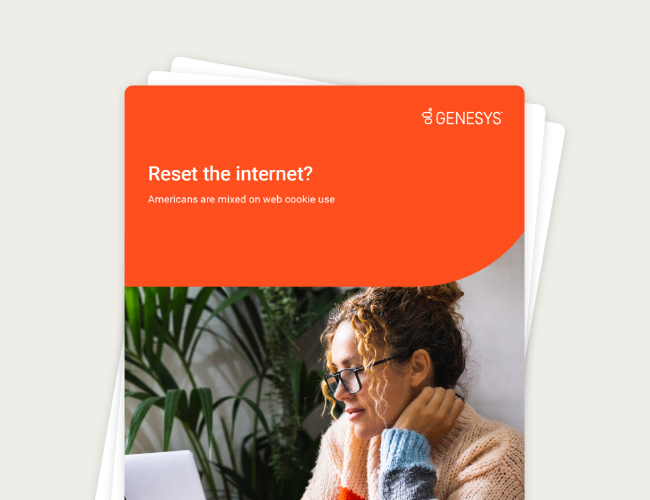Your Genesys Blog Subscription has been confirmed!
Please add genesys@email.genesys.com to your safe sender list to ensure you receive the weekly blog notifications.
Subscribe to our free newsletter and get blog updates in your inbox
Don't Show This Again.

The (internet) cookie continues to crumble.
For nearly three decades, “cookies” have been a staple of the web. These little bits of information serve many purposes: Helping you log into a website, storing your preferences or personalizing your product recommendations. Companies can also use cookies to track you across the internet and target you with precise — or even creepy — ads.
Many Americans feel like the internet knows too much about them. In fact, 63% wish they had a “reset button” for how much the internet knows, even if it means losing some of the conveniences of personalization, according to a new consumer research study by Genesys.
Debate about the use of cookies is nothing new. But this year could mark a major shift in cookie use and internet privacy.
Earlier this year, Google began testing Tracking Protection, a new feature that limits cross-site internet tracking and restricts website access to third-party cookies by default. It plans to roll this protection out to 1% of Chrome users globally, a key milestone in its Privacy Sandbox initiative to phase out third-party cookies completely.
The Google Chrome browser accounts for 64.73% of the worldwide browser market, according to the December 2023 StatCounter report. And this initiative could eventually affect billions of global users.
With this major shift on the horizon, we’re going to explore some research about cookies — and how businesses can differentiate themselves by using consumer information effectively.
Many Americans don’t know what internet cookies are — and are oblivious to them as they traverse the web.
Specifically, a study of 1,000 US adults found that:
In the Genesys study, Americans expressed wide-ranging attitudes toward web cookies. Some find them valuable for personalizing recommendations to other products or services. But others find cookie-driven advertisements frustrating — and inappropriate.

Download the white paper to discover what Americans value most in online personalization and how your company can revamp its recipe for long-term loyalty.
Over half (55%) prefer that an organization retains some information about them.
But many Americans also expressed frustration and a desire for greater control over their data:
When it comes to service interactions, a fast response and a first-contact resolution are what consumers worldwide value the most, according to the 2023 Genesys report, “The State of Customer Experience.” And organizations are more likely to resolve customer issues quickly and completely when companies listen to them and understand their expectations and needs.
But this is about more than just speed — it’s about relevance. Listening attentively and empathizing with the customer enables companies to personalize interactions with relevant information, answers and recommendations.
And personalization pays off in big ways — enabling organizations to increase short- and long-term customer value, while growing revenue and reach.
More than 80% of the 5,517 consumers surveyed in the 2023 Genesys report say they’d purchase additional items from companies that consistently personalize their customer service experiences. Nearly as many would buy more often and recommend those companies. And over half say they’d pay more to buy from companies that personalize their experiences.
Despite these clear benefits, just 35% of the 646 “CX Leaders” in “The State of Customer Experience” say their company offers a highly personalized customer experience today. Many of these companies are hampered by disconnected technology and data in their ability to respond to customer preferences — especially when it comes to responding to customer needs in real time.
And the most valuable forms of personalization happen during customer service interactions. Consumers worldwide say that “Receiving the services I need at any time and in my preferred channel of choice,” and “Being connected straightaway with the right person to help me” lead the list of preferred ways that businesses can personalize customer experiences.
Offering the right services at the right time and in the right channel requires having well-designed journeys and the technology to remove any obstacles. This involves using data and artificial intelligence to listen and understand predicted intent. Then you can provide the most appropriate resource, whether that’s a human interaction, a chatbot or the precise information to answer a specific question. And because your customers expect this type of personalization, they welcome it.
Regardless of how the internet cookie crumbles, consumers crave empathy and are delighted with seamless, low-effort experiences. Businesses can differentiate by providing experiences that make their customers — and employees — feel known, heard and understood.
Leading businesses can coordinate every step of every experience to provide personalized, meaningful and connected interactions from beginning to end — regardless of the time, context or channel. And that requires an open, AI-powered cloud platform that unifies experiences across channels. This cloud platform should protect your data, customers and business and endeavor to provide the greatest information security and transparency possible.
Check out this ebook for more insights on how Americans feel about cookies and internet privacy.
Subscribe to our free newsletter and get blog updates in your inbox.
Related capabilities: